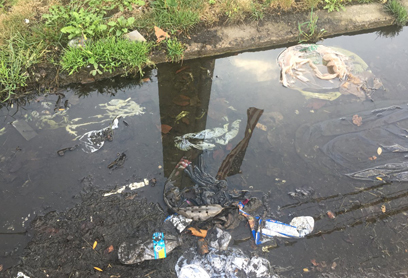The city must take action to stop the regular flooding along Bergen Avenue, says a local pol, because the standing water is a breeding ground for mosquitoes in the summer, and can freeze over in colder months, becoming a hazard for pedestrians.
New legislation would require the Department of Transportation to promptly address so-called “ponding” problems on hundreds of city-owned streets, many of which are in the little-known neighborhood of Georgetown, said the bill’s sponsor, Councilman Alan Maisel (D–Georgetown).
“Ponding, of course, is a vexatious issue if you happen to live in a house where there’s water accumulating,” said Maisel during a Sept. 18 hearing with the agency. “Sometimes the water becomes feted, and there is ice that’s created in the winter. It’s just people can’t sell their homes because they have serious ponding problems.”
Maisel has been wrangling with the city for years to simply lay down an extra layer of asphalt in depressions along Bergen Avenue near Avenue T that regularly collect several inches of murky water — along with piles of trash and bugs — after even mild rain. But the Department of Transportation has consistently refused, claiming the entire strip is due for a complete makeover next year, which would be a better fix, anyway.
“DOT is aware of community concerns in this area, and expects to bid this project for construction in FY18, which is the best solution to address the issue long term,” said a spokeswoman for the Department of Transportation.
Local leaders acknowledge that asphalt infill wouldn’t put an end to the troublesome floods, but it would be better than nothing, and residents shouldn’t have to wait another year to see the problem addressed, said Community Board 18’s district manager, whose office is on Bergen Avenue.
“Most of Bergen Avenue’s roadway is in bad disrepair. Flooding areas along Bergen Avenue near Avenue T, as well as all flooding areas along this heavily travelled street must be addressed in the meantime,” said Dottie Turano. “We encourage DOT to keep this area safe while striving to move the capital project for complete reconstruction of the sewers and roadbed. Repairs are only temporary. It’s like putting a band aid on an arterial bleed.”
The standing water is an issue right now for locals who need a dry path to and from the sidewalk, said one mother who was pushing a stroller along Avenue T, where she lives.
“It’s a problem,” said Angelica Zeldi. “When it rains outside, it’s really hard to get on the sidewalk.”
And what’s more, there’s a double standard when the city fines homeowners for similar puddles on private property but lets water sit for days or even weeks on public streets, said Maisel, citing one of his constituents who was fined nearly $1,000 for about an inch of water that had accumulated on her pool cover while she was away.
“This is my idea of justice. If the city gets a notice that there’s a ponding situation, they have 60 days to care of it,” he said, describing how his legislation would work. “It’s just not fair to give violations to citizens who are not meeting their responsibility, but the city has thousands of ponding problems.”
Maisel’s legislation is currently before the council’s Transportation Committee. He said he expects pushback, but will continue to fight for it.
“We just had a hearing. We’re going to fight to make sure it does get passed,” Maisel said. “It’s not fair to penalize citizens for what they do but the city does not take responsibility for what it doesn’t do.”





















